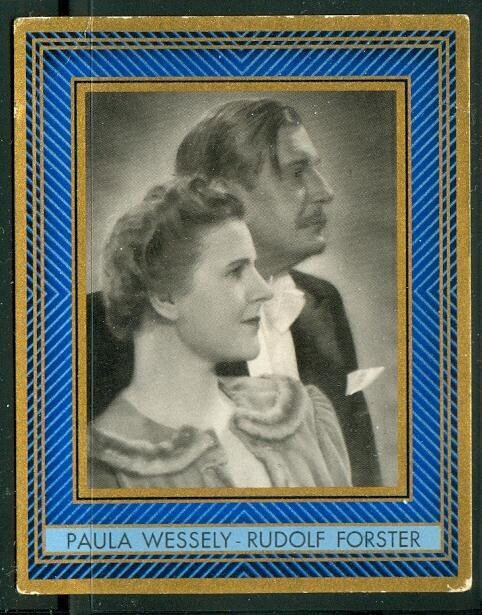
1937: Rudolf Forster/Paula Wessely, cigarette card #305
Rudolf Forster and Paula Wessely ~ This is card #305 from the Bunte Filmbilder cigarette card series. It is a vintage 1937 original. An absolutely amazing example of a 70+ year old item. It is larger than a British or American cigarette card (over 2¼"x2¾"). Click on my scan to greatly enlarge the image (opens a new browser window).
Rudolf Forster brought Bertolt Brecht's Mack the Knife (Mackie Messer or Macheath) to the screen in the early German talkie The Threepenny Opera or Die Dreigroschenoper directed by Georg Wilhelm Pabst in 1931. It was probably the first great starring role for Forster. Born 30 October 1884 at Gröbming, Styria, in what was then empire of Austria-Hungary. Died 26 October 1968 at Bad Aussee, Styria, Austria. Rudolf Forster had a long career that reached from silent films through television. His entire career, however, seems to have been spent in Austrian and German films with the exception of Island of Lost Men (1939). Only his early silent efforts had any real success in British or American markets. His only dry spell came after World War II when he suffered the five year boycott that was typical for actors too closely identified with the Nazi regime. His first film role was Graf Ljevin in the 1919 production of Anna Karenina. By 1922 he had graduated to supporting roles in films like Lydia Sanin, in which he starred with that giant of the German screen Hans Albers, and Adam und Eva (1923) with Werner Krauss. He also starred in 1925's The Chronicles of the Gray House with Lil Dagover. Forster had the misfortune to star in Morgenrot (1933) which was the first German film screened after Adolf Hitler came to power and has long been considered a symbol of the Nazi state.. Although Morgenrot or Dawn is the tale of a WWI German U-Boat and does display German values it should not be considered a Nazi film. The film makers actually had monarchist leanings and no love for Hitler. During the Nazi era, Forster did not appear in any major propaganda efforts but did star in Wien 1910 (1943) in which the film makers did manage to make an anti-Nazi statement.
Paula Wessely was Austria's foremost popular postwar stage actress. In 1938 she was the speaking voice of Snow White in the first German-dubbed version of Walt Disney's Snow White and the Seven Dwarfs. This version was rereleased in 1948 in Austria, 1950 in Germany (first public viewing ever) and in 1957 for the last time in Austria and Germany. Unfortunately Disney Germany redubbed this movie in 1966 and again in 1994. Wessely's most famous film role was in the anti-Polish propaganda film Heimkehr (AKA Homecoming) in 1941, for which she was much criticized after World War II. Blacklisted from film in the immediate postwar era, Wessely returned to the stage where she thrived for four decades.
